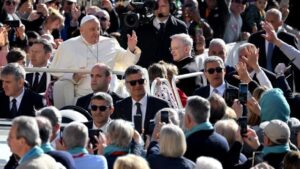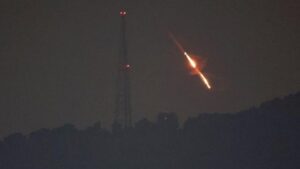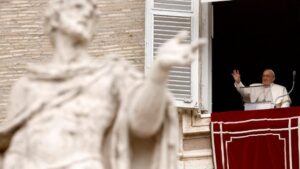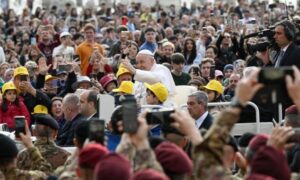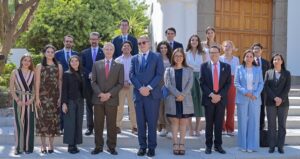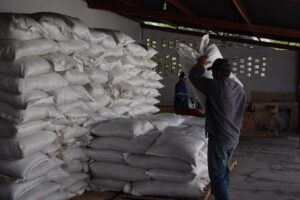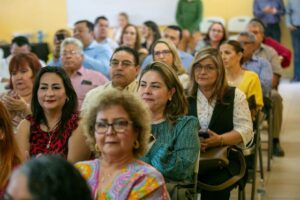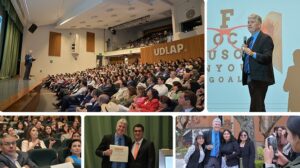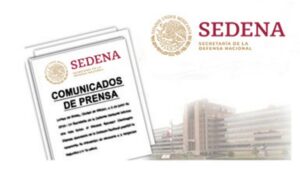Joint press point
With NATO Secretary General Jens Stoltenberg and German Defence Minister Annegret Kramp-Karrenbauer
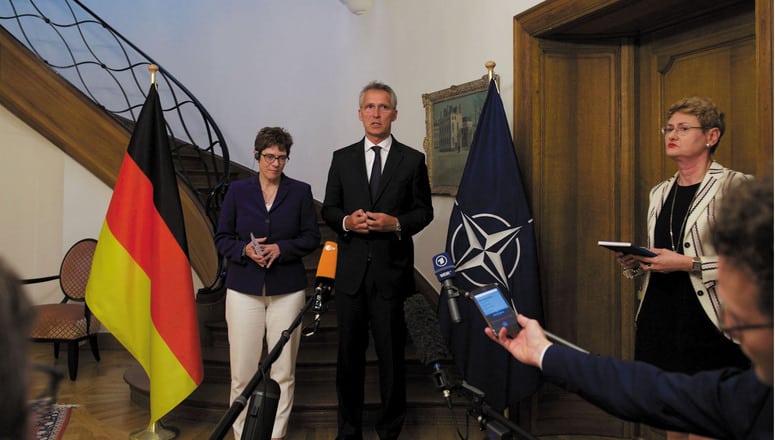
NATO Secretary General Jens Stoltenberg and Annegret Kramp-Karrenbauer Minister of Defence of the Federal Republic of Germany
So Minister Kramp-Karrenbauer, Annegret, welcome. It is great to see you so soon after your appointment. And let me first congratulate you on your appointment as Defence Minister of Germany.
I welcome also your strong personal commitment to our Alliance, to NATO. And Germany has been for many many years a staunch supporter of NATO and you contribute to NATO in many different ways. Germany leads the NATO battle group in Lithuania, you are one of the lead nations in Afghanistan, and you participate in NATO maritime operations and in many other missions and activities including Kosovo in the Balkans.
I also welcome the fact that you’ve been so committed and clear to the importance of increased defence spending. We live in a more unpredictable world and therefore we need to invest more in our security. We are faced with a more assertive Russia, we see the demise of the INF Treaty, and therefore there is a need for a strong unity in NATO to respond to the challenges we are faced with.
I really look forward to working together with you, addressing a wide range of different issues, and also to discuss them later on during the lunch we’ll have today. One of the issues we are faced with is the situation in Afghanistan, where we see continued violence but also new possibilities for peace.
So once again, congratulations and warm welcome to my house and to the lunch, and I look forward to working closely with you in the time that comes.
Annegret Kramp-Karrenbauer [Minister of Defence of the Federal Republic of Germany]:
[Translated from German]
Thank you, Secretary General Stoltenberg,
Jens,
It is truly a great pleasure and a great honour, and it was also a particular wish of mine, that my first foreign trip as Defence Minister should bring me here to NATO in Brussels. I appreciate it very much and would like to express my sincere thanks for the opportunity for a personal exchange that we shall have today.
I made it very clear in my government statement, and it is also my deep conviction, that NATO is our anchor, our frame of reference for the security we are striving for together. Germany is therefore proud to be an important part of NATO and proud above all that we stand by the agreements we have made.
I am very glad that you have just mentioned once again the contribution Germany makes in the various missions and with the possibilities that we offer. But we in Germany have in recent years set ourselves the goal of building up, of rebuilding, the Federal Armed Forces. It is a goal that comes from national aims, but also from commitments and obligations to the Alliance. And to achieve this goal, in our own national interests too, we need the appropriate resources to be able to carry these efforts through. And that means we need 1.5% of gross domestic product by 2024 and we must also continue along the ever-upward path in pursuit of fulfilment of our obligations within NATO as regards the 2% target. That will be one of the upcoming tasks and one of the upcoming debates in German politics.
We are a loyal partner and a loyal member state of NATO, and we want to remain so in the future too. And with that in mind I look forward to the joint discussion, but also and above all to the joint effort.
Oana Lungescu [NATO spokesperson]: Okay, we have time for a couple of questions, DPA?
Question [DPA]: Secretary General, a question on Iran: do you personally support the US maritime security initiative? And would you recommend Allies to join this initiative. [In German]
Jens Stoltenberg: NATO Allies are concerned about the situation in the Gulf and the freedom of navigation is, of course, of great importance for all NATO Allies. And several NATO Allies have already assets in the Gulf, but there has been no request for a NATO mission in the Gulf.
NATO Allies also share their concerns about the activities of Iran in the region. Their destabilising activities; their support for different terrorist groups; the Iranian missile programme and also the fact that they have resumed enrichment of uranium. So we continue to follow the situation very closely. We exchange intelligence information about the situation and, for instance, at the Defence Ministerial Meeting of NATO in June, this was an issue that was discussed at the meeting and between NATO Allies, where also they discussed the possibility of Allies contributing assets, but not as part of a NATO mission.
Annegret Kramp-Karrenbauer: [In German]
Question [ZDF]: Friday will mark the end of the INF Treaty, as you’ve just mentioned. What does that mean for the security of the West and what consequences should we draw from it. How will NATO react? [In German]
Jens Stoltenberg: The INF Treaty has been a cornerstone for European security for decades, because the INF Treaty bans a whole category of weapons, all intermediate-range weapons. And therefore we have called on Russia again and again to come back into compliance and to respect the INF Treaty. The problem and the reason why we now see the demise of the INF Treaty is that Russia is violating the treaty. Russia has, over several years, deployed new intermediate-range weapons. They are dual-capable, they can carry nuclear weapons, they can reach European cities within minutes, they are mobile, hard to detect and they also reduce the threshold of any potential use of nuclear weapons in armed conflict.
Of course, we still call on Russia to come back into compliance to save the treaty, but at the same time we are prepared for a world without the INF Treaty, with more Russian missiles. And the NATO defence ministers made a decision at our meeting in June that we will respond, but we will respond in a defensive, coordinated and measured way. We will look into conventional options: air and missile defence, better intelligence, exercises and also new initiatives on arms control. We will not mirror what Russia is doing. We don’t intend to deploy new nuclear land-based systems in Europe. But, of course, we have to make sure that also after the demise of the INF Treaty with more Russian missiles in Europe, we need to make sure that we continue to have credible deterrence and defence and we will do what is necessary to maintain credible deterrence and defence.
Annegret Kramp-Karrenbauer: [In German]
Question [Deutschlandfunk]: I have a question on burden-sharing to both of you. [In German] And to the Secretary General, how optimistic are you that the new German Minister of Defence will be able to make sure that Germany will reach 1.5 percent GDP in 2024, maybe even 2 percent? Thank you.
Annegret Kramp-Karrenbauer: [In German]
Jens Stoltenberg: I am confident that Germany will make good on the promises that Germany and all other Allies made back in 2014. We have to remember that the pledge to increase defence spending was something we all agreed at the NATO summit in Wales in 2014. This is something we do because it is in our security interests to invest more.
NATO Allies reduced defence spending after the end of the Cold War because then tensions went down. But when we are cutting defence spending when tensions are going down, we have to be able to increase defence spending when tensions are increasing, as we see now. And I welcome the fact that Germany has started to increase. We have seen a significant increase in German defence spending over the last years and we have also seen the fact that Germany, as the Minister referred to, has submitted plans to NATO showing that the increase will continue, as promised in the national plan submitted by Germany to NATO.
Let me also add that I’m a politician and I know that politicians, they prefer to spend money on health, on education, on infrastructure instead of defence. And that’s the reason why we reduced when tensions went down. But sometimes it is necessary to invest more in defence. And now we see new challenges, new threats, and therefore we need to increase defence spending. And I’m absolutely certain that, not only Germany, but also other Allies, will meet the promises and the pledges they made back in 2014.
Oana Lungescu: Thank you very much.
Annegret Kramp-Karrenbauer: Thank you.
Jens Stoltenberg: Thank you so much.

